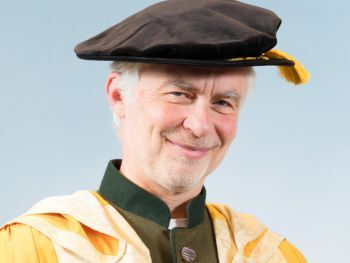University News Last updated 10 January

An advocate and campaigner for vision rehabilitation says comedian Chris McCausland “has been a beacon for what blind people can do” following his success in the hit BBC show Strictly Come Dancing.
McCausland lost his sight due to retinitis pigmentosa but won the acclaim of judges and the British public to claim victory in the competition with dance partner Dianne Buswell.
“He's defied expectations,” said Simon Labbett, a Vision Rehabilitation Specialist who has been awarded an honorary doctorate by Birmingham City University (BCU) “What is most striking, speaking professionally, is his lack of fear about moving in space.
“If you don't have sight, moving around at all can be intensely intimidating. Moving around in a big open space - swirling around actually - and having to interact with another human who is also swirling around, and do it with little verbal communication… it’s astonishing, it really is.
“Being a mobility teacher for vision impaired people, I know this from experience.”
Simon (pictured above) received his honorary doctorate at a ceremony at Birmingham’s Symphony Hall on Thursday 9 January.
“I was really, really moved, because it is recognition of the kind that I really value,” said Simon.
“It's not like a pat on the back for being a good bloke or something, it's a pat on the back for actually putting some graft in with like-minded people and then getting endorsed by the largest institution responsible for training the future professionals. That really means something.”
Simon said his motivation to be an agent of change for visually impaired people grew when he began working for the Royal National Institute of Blind People.
“I met a very interesting bunch of people,” he said. “I got interested by what it means to be blind and how people adapt when they lose their sight.
"Seeing how people overcome challenges when you don't have one of your major senses is really intriguing and it's taken me on journey where I want to find out how to support people in that situation.”
It was the impact eyesight loss had on artists that evoked Simon’s interest.
“The effect was mainly triggered when I was working with people who painted,” he said. “If you're an artist, that's what you do and it’s how you define yourself. To lose that ability…. it's pretty fundamental. How do you compensate?”
Simon was also a key player in the founding of the Rehabilitation Workers Professional Network, the professional body that represents Vision Rehabilitation Specialists.
“The body that previously represented us folded, so I was one of the people who tried to put things back together,” he said. “I suppose I was the main driving force behind that. It's achieved quite a few objectives.
"It's certainly raised the profile of what we do. Even in the visual impairment sector and the world of blind charities, rehabilitation has not always had the profile it needs.
“It’s about trying to get our colleagues in the blind world to recognise what we as professionals do. We’ve done that, I think.
“It's also helped to monitor standards. It is definitely making inroads, but we're a very small professional body. There's 450 of us, so it's tiny, but it's important work that we do.”
Simon, whose day job is working in the sensory needs service at Bradford Adult Social Services, paid tribute to BCU for the work it has done to develop the workforce, which includes rehabilitation specialists.
“It's the only university setting in the country that's qualifying professionals,” he said.
“I did my initial qualification here and then BCU led the way in creating a degree pathway. I did the degree here and I've come back to deliver lectures to students about professional standards.
“BCU is the centre of knowledge. It is providing a good quality of education to the students, and we know the teaching staff are incredibly dedicated.”